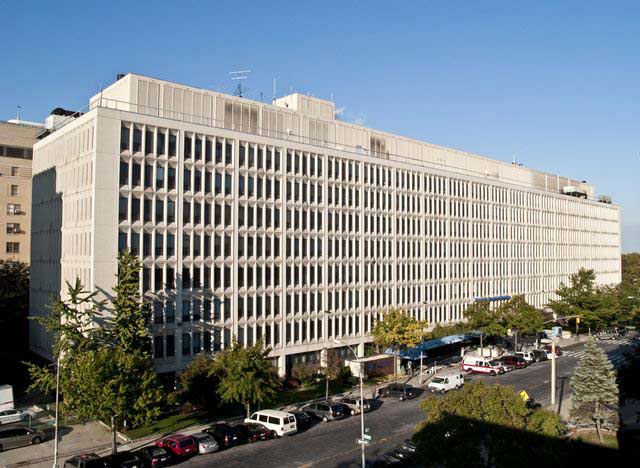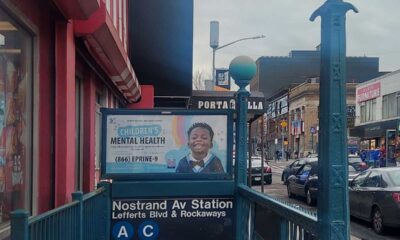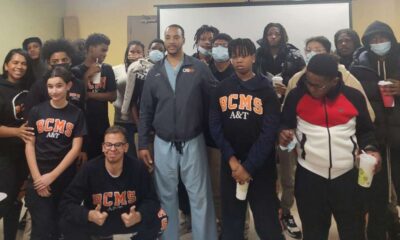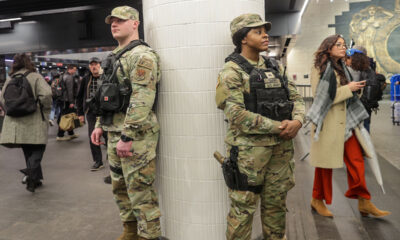Health & Wellness
Efforts to Save SUNY Downstate Medical Center Continue During Budget Negotiations

By Mary Alice Miller
Every now and then Gov. Hochul seems to forget who helped her get her slim margin of victory in her first full term election. She opened the year by announcing a ‘restructuring’ of SUNY Downstate Medical Center. The ‘brand transformation’ would be funded by a proposed $300 million for capital funding and operating costs. In-patient beds would be transferred across the street to over-capacity Kings County Hospital, part of NYC’s Health and Hospital Corporation, while SUNY Downstate would expand urgent care and ambulatory surgery services.
Hochul’s rationale is a $100 million annual deficit and buildings that sorely need maintenance and upgrades. SUNY Chancellor John King and Downstate President Wayne Riley support the plan.
SUNY Downstate has been a valued community resource since its inception. It is the only academic medical center in Brooklyn. Elder activists recall when Malcolm X came to the site to stand with CORE and Black construction workers in 1963 to protest racial discrimination in the construction trades, demanding jobs to help build the facility.
More NYC physicians have trained at SUNY Downstate than any other medical school – 36% are Brooklyn residents; 70% are NYC residents. 57% of undergrad and graduate Downstate students are minorities (27% white, 25% Asian, 24% Black or African American, 13% Hispanic or Latino, 2% other, including American Indian or Alaska Native).
There are currently 2,300 employees at SUNY Downstate; 20% or more could lose their jobs due to the restructuring. The 342-bed hospital serves a patient population of 75% African American/African Caribbean, 12% Hispanic/Latino, 7% white, and 2% Asian.
SUNY Downstate houses Brooklyn’s only kidney transplant program and is one of two Regional Perinatal Centers in Brooklyn, providing care for high-risk pregnancies and deliveries.
United University Professions President Fred Kowal calls Gov. Hochul’s plan “the wrong choice for patients, students, and the community. Rather than heeding the call of local patients and community members asking for a meaningful discussion about the future of the institution, Gov. Hochul seems poised to plow ahead with this destructive agenda – devised in secret and presented as a fait accompli – which will undoubtedly harm the health of the Central Brooklyn community.”
Kowal “looks forward to working with the Legislature to correct this plan’s complete disregard for Downstate hospital’s thousands of employees, tens of thousands of patients, and even more community partners.”
The Assembly supports Gov. Hochul’s funding request while establishing a commission to study the preservation of hospital services to underserved central Brooklyn residents. The Senate wants a commission that plans for SUNY Downstate’s future.
“Protecting SUNY Downstate is personal for me: during the darkest days of the pandemic, their staff treated me and so many of my constituents,” said Senator Zellnor Myrie. “In 2022, we wrote a law requiring a report on Downstate’s infrastructure needs.
The State has not complied with that law, yet they are basing their entire plan to close Downstate on its alleged ‘capital needs’”.
Myrie held a rally attended by 1,200 healthcare workers and community members in support of SUNY Downstate which is located in his district. “The message has been and continues to be clear: this community opposes any plan to reduce healthcare access where it’s needed most in central Brooklyn,” said Myrie.
Senator Kevin Parker called on Brooklyn’s Congressional delegation to secure an allocation of $1 billion in capital funding to support the transition of SUNY Downstate Health Sciences University Medical Center into a predominately outpatient facility.
The funding would fund extensive renovations and upgrades to existing facilities, the acquisition of cutting-edge medical technology and equipment to enhance diagnostic and treatment capabilities, support innovative healthcare programs and research projects aimed at improving patient outcomes and community health and expand educational and training opportunities for the next generation of healthcare professionals.
“The transformation of SUNY Downstate is not just a vision; it’s a necessity,” said Parker. “As Brooklyn continues to grow and evolve, we must adapt our approach to healthcare delivery. We have a unique opportunity to redefine what community healthcare looks like and it starts with ensuring SUNY Downstate has the resources it needs to succeed.”
Senator Parker also called on NYS Comptroller Thomas DiNapoli to undertake a thorough and detailed audit of SUNY Downstate’s finances and operations. “The potential impact of arbitrary layoffs and reducing headcounts at SUNY Downstate could be detrimental; not just to the employees, but more critically, to the provision of healthcare in our community,” said Senator Parker.
“It is our duty to protect the public’s interest by verifying the financial health and operational efficiency of this institution through a comprehensive audit. We must prevent the erosion of healthcare services and the possible negative outcomes that may arise from improper staffing decisions.”
Assemblywoman Latrice Walker expressed her support for legislation that will allow for improved public notice and public engagement when hospitals and certain unit closures are threatened, and to strengthen state review of such closings.
“I remember when I was a patient at SUNY Downstate. It was critical. I had pancreatitis. Nothing I could have by mouth other than the ice chips that my NYSNA nurse would bring for me every day,” said Assemblywoman Walker. “We have been in this fight before. Billions of dollars have been given in federal aid based on a federal Medicaid waiver.
When we asked for some of these resources, they said it’s not for SUNY Downstate. The dollars that you are saving by not having to pay back the federal government can be used for our hospitals. Yes, Brooklyn needs Downstate.”
Walker stated, “No matter how many public announcements, no matter how many public forums that we may have to combat the closure of hospitals across New York State, the fact remains that our hospitals are being starved particularly in communities like mine where 90% of patients at hospitals are on Medicaid and/or Medicare who as we know are paying 30 cents on the dollar for all healthcare costs.
So, it doesn’t matter what type of hearings are being held when our hospitals are not receiving the type of resources that they need in order to provide quality healthcare.”
She added, “We are facing the closure of SUNY Downstate in our community. We are 100% fighting back against it.”













